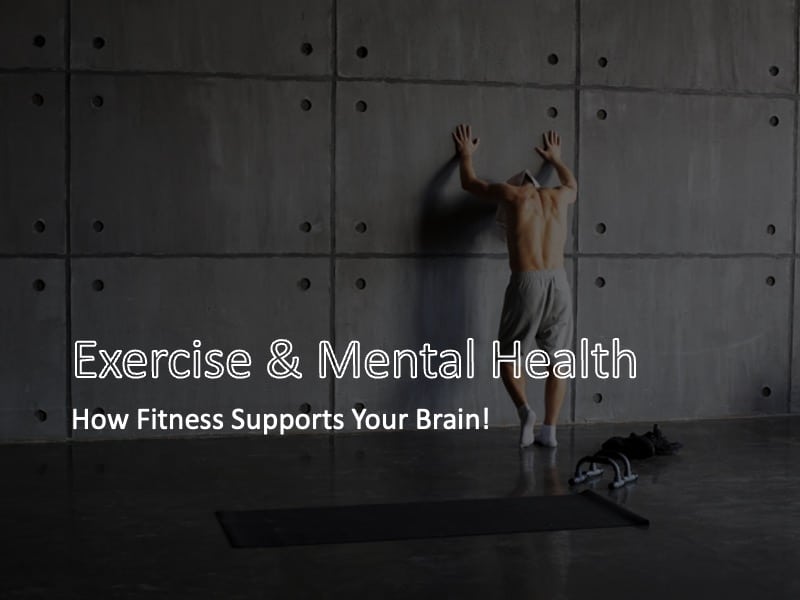Exercise and Mental Health: How Exercise Supports Your Brain
While most people associate regular physical activity with physical fitness and longevity, its impact on mental health is just as powerful, if not more transformative.
The connection between exercise and mental health is backed by compelling research and personal experience: consistent movement can reduce stress, elevate mood, sharpen focus, and even prevent or manage mental health disorders such as anxiety and depression.
Throughout my life and professional basketball career, physical exercise has been a core part of my mental wellness toolkit.
Living with Tourette syndrome, I’ve used fitness and sports not just to stay in shape but to support my emotional balance, social engagement, and mental clarity.
Training sessions are when I feel most focused and centered, despite the occasional worsening of motor tics from heightened exertion.
What’s remarkable is that even with those challenges, exercise has helped me navigate everything from performance anxiety to everyday stress.
Whether it’s a solo gym session or a high-stakes basketball game, being active consistently improves my resilience and outlook on life.
Beyond that, I’ve seen how sports participation can improve cognitive performance, time management, and communication, further emphasizing the mental health benefits of exercise.
The relationship between exercise and mental health isn’t just anecdotal.
It’s built on decades of neuroscience and psychology research showing how movement promotes better brain health, mood regulation, and emotional stability.
From young students to high-performing athletes to adults battling burnout from work, fitness supports mental health at every level.
What is the Link Between Exercise and Mental Health?

The connection between exercise and mental health is rooted in powerful neurochemical and physiological changes that take place when we move our bodies.
Physical activity stimulates the release of endorphins, which are natural chemicals that boost mood and create a sense of well-being, while also increasing levels of serotonin and dopamine, which are crucial for emotional regulation and motivation.
Consistent exercise helps regulate cortisol, the body’s primary stress hormone, leading to a calmer nervous system and greater emotional resilience.
This makes it easier to stress less when dealing with day-to-day problems and long-term psychological challenges.
Research overwhelmingly supports the relationship between physical exercise and mental health.
Aerobic activities like running, swimming, and cycling have been shown to significantly reduce symptoms of depression.
Meanwhile, resistance training and flexibility-based practices like stretching or mobility work are effective in lowering anxiety levels and promoting a relaxed state of mind.
Another emerging area of interest is how exercise supports the gut-brain axis, the intricate communication pathway between your gastrointestinal system and central nervous system.
Regular physical activity promotes a more diverse and balanced gut microbiome, which plays a vital role in mood regulation and cognitive function by supporting neurotransmitter production and reducing inflammation (Dalton et al., 2019).
Whether you’re supporting your own journey or trying to help someone with mental health problems, incorporating regular movement is one of the most effective and accessible ways to improve both mental and emotional health.
The science is clear: exercise improves mental health outcomes, enhances brain function, and helps individuals build long-term emotional strength.
Aspects of Mental Health that Exercise Can Improve
Exercise offers a multitude of mental health benefits, ranging from reduced symptoms of depression and anxiety to improved cognitive function and emotional resilience.
Supported by scientific research, it is evident that incorporating physical activity into your routine can have a profound impact on mental well-being.
Whether you’re struggling with a mental health disorder or simply looking to enhance your overall mood and outlook, exercise is a powerful tool to promote good mental health.
Depression

A 2019 meta-analysis published in Depression and Anxiety reviewed multiple studies examining the effects of physical activity on individuals with depression.
The analysis found that regular aerobic exercise, particularly running and cycling, reduced depressive symptoms in individuals across various age groups and health statuses.
It concluded that exercise could be as effective as antidepressant medications in reducing mild to moderate depression symptoms (Schuch et al., 2019).
This highlights how exercise can serve as both a preventative and therapeutic tool for those struggling with depression.
Anxiety
A 2018 study published in the Journal of Anxiety Disorders investigated the effects of resistance training on anxiety levels in individuals with generalized anxiety disorder (GAD).
Participants who engaged in moderate-intensity resistance training twice a week for 12 weeks saw a significant reduction in their anxiety symptoms.
The study suggested that the physiological improvements from exercise, including better regulation of heart rate and muscle tension, were partly responsible for these mental health benefits (Gordon et al., 2018).
This demonstrates that strength-based exercises are a potent method for managing anxiety.
Cognitive Function and Neuroplasticity
Physical activity also promotes long-term mental health by improving cognitive function and neuroplasticity—the brain’s ability to adapt and reorganize itself.
According to research published in Frontiers in Psychology, aerobic exercise enhances neuroplasticity by increasing blood flow to the brain and stimulating the growth of new neurons, which leads to improved memory, learning, and emotional regulation.
This finding is particularly significant for individuals dealing with cognitive decline or mental health issues rooted in brain function (Stillman et al., 2020).
Benefits of Exercise for Mental Health

The mental health benefits of exercise go far beyond a temporary mood boost.
As research continues to confirm, regular movement improves emotional regulation, builds resilience to stress, and fosters a greater sense of purpose and self-esteem.
From aerobic workouts to strength training and stretching routines, every form of exercise has the potential to positively shape your psychological well-being.
Stress Relief and Emotional Resilience
One of the most immediate mental health benefits of exercise is its ability to reduce stress.
Physical activity lowers cortisol, the body’s primary stress hormone, while increasing the production of endorphins, dopamine, and serotonin.
These mood-enhancing chemicals help alleviate anxiety and tension, fostering a sense of calm and well-being.
By consistently engaging in physical exercise, individuals build emotional resilience and develop a stronger ability to handle life’s daily pressures.
This buffering effect against stress is one of the key reasons why the link between exercise and mental health is so well-documented.
Better Sleep Quality
Quality sleep is foundational for mental health, and exercise plays a critical role in improving sleep patterns.
Regular physical activity helps regulate the body’s internal clock, also known as circadian rhythms, leading to more restful and consistent sleep cycles (Alnawwar et al., 2023).
Whether through aerobic workouts or strength training, exercise enhances both sleep duration and quality, which in turn supports emotional stability, memory consolidation, and a reduced risk of mood disorders.
For those struggling with insomnia, depression, or anxiety, exercise and mental health improvements often begin with better rest.
Improved Self-Esteem and Social Engagement
Participating in physical activity improve self-worth by offering a tangible sense of progress and accomplishment.
Whether it’s completing a workout, reaching a fitness milestone, or simply staying committed to your routine, these wins can help you build confidence and self-esteem while improving your self-image.
Additionally, group-based exercise, such as team sports, fitness classes, or walking clubs, creates opportunities for social interaction, which plays a crucial role in protecting against loneliness and isolation.
These mental health benefits of exercise are especially important for individuals dealing with low mood, social anxiety, or self-esteem challenges.
Improved Gut Health
The gut-brain axis, a key player in mental health, is highly responsive to physical activity.
Engaging in regular aerobic exercise like walking, swimming, or cycling supports a diverse and balanced gut microbiome, which influences neurotransmitter production and emotional regulation.
These microbiota-driven changes can increase levels of serotonin and other neurochemicals tied to mood stability.
Exercise also promotes the production of short-chain fatty acids (SCFAs), which strengthen the gut lining and reduce inflammation, which are factors that directly impact cognitive function and stress resilience.
Combining aerobic exercise with strength training or mobility training can further increase the communication between the gut and brain by reducing stress, supporting neurotransmitter production like serotonin, and promoting the production of short-chain fatty acids (SCFAs).
These benefits improve both gut integrity and mental health and make physical exercise a powerful tool for improving both digestive and mental well-being.
Practical Tips for Using Exercise to Improve Mental Health
Making exercise a consistent part of your routine is one of the most effective strategies for improving mental well-being.
But to unlock the full mental health benefits of exercise, it’s essential to approach fitness with balance, intention, and sustainability.
Whether you’re a beginner or a seasoned athlete, these strategies can help you use movement to support your emotional and psychological health.
Start Small and Stay Consistent
If you’re new to working out, start with simple, approachable activities like walking, stretching, or light resistance training.
These low-impact forms of physical exercise can quickly elevate your mood and reduce anxiety without placing too much strain on your body.
Gradually build up your routine as your confidence and energy improve.
Small, consistent steps are more effective for mental wellness than pushing too hard and risking burnout.
Mix Cardio with Strength Training

To support all aspects of exercise and mental health, blend aerobic activity with strength-based workouts.
Cardio exercises such as brisk walking, swimming, or cycling are especially effective for managing stress and boosting endorphin levels.
Meanwhile, resistance training, including both bodyweight exercises and weight training, can improve self-efficacy and mental toughness.
This combination supports emotional regulation, sleep quality, and overall cognitive function.
Try a Group Exercise Class or Team Sport
Group-based movement can be a powerful tool for improving both mental health and social well-being.
Whether you join a basketball league, a pilates class, or a local walking group, being active with others helps reduce feelings of isolation, boost motivation, and build a sense of community.
Social interaction during workouts also improves self-esteem and emotional connection, which are vital for maintaining good mental health.
Prioritize Consistency Over Intensity
You don’t need to push yourself to exhaustion to experience the mental rewards of exercise.
In fact, exercise consistency is more important than exercise intensity, and moderate, consistent workouts are more sustainable and beneficial for emotional balance.
Set SMART goals (Specific, Measurable, Achievable, Relevant, and Time-bound) to help track progress and maintain motivation.

The true value lies in making physical activity a regular healthy habit, not in going all-out for a short period and then burning out.
Incorporate Mindfulness Into Your Movement
Blending mindful awareness with exercise can significantly enhance its mental health benefits.
When you focus on your breath, body sensations, and surroundings during physical activity, you anchor yourself in the present moment, helping to quiet racing thoughts and reduce anxiety.
While some people use practices like yoga or tai chi for mindfulness, I personally avoid these methods due to their pagan spiritual roots, even though they are somewhat evidence-based.
Instead, I recommend integrating mindfulness in a more straightforward way.
You can practice mindful movement by:
- Paying attention to the rhythm of your breathing as you run or lift.
- Noticing how your muscles feel with each repetition or stretch.
- Walking without distractions, no music or phone, just taking in the environment around you.
This intentional presence during exercise not only helps calm the nervous system but also builds emotional awareness, self-discipline, and long-term mental resilience.
Final Thoughts: The Connection Between Exercise and Mental Health
The relationship between exercise and mental health is one of the most powerful and accessible tools we have for improving emotional well-being, reducing stress, and building long-term resilience.
Whether you’re managing anxiety, battling depression, or simply looking to feel more focused and energized, consistent physical activity can play a central role in your mental health journey.
If you’re ready to take that first step, my 7-Day Detox is a great place to start.
This program is designed to help you clear out unhealthy habits and establish a foundation of nourishing movement, better nutrition, and positive mental routines that help you become a healthy person for life!
You’ll walk away with a practical plan, not just for short-term change, but for creating a lifestyle rooted in strength, balance, and well-being.
It’s not about perfection, it’s about building a healthier, more grounded version of yourself, one step at a time.
Subscribe to My Newsletter

Subscribe to my newsletter to receive occasional updates on new articles and health and fitness tips. Also, you will receive my 60-page eBook on resetting your body and mind in 7-days for FREE!
This website does not provide medical advice. This website site does contain affiliate links, and purchases may earn a commission.
Read my Medical Disclaimer, Review Disclaimer, and Publishing Policies for more details. Use of this site indicates acceptance of these terms.


